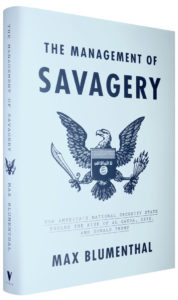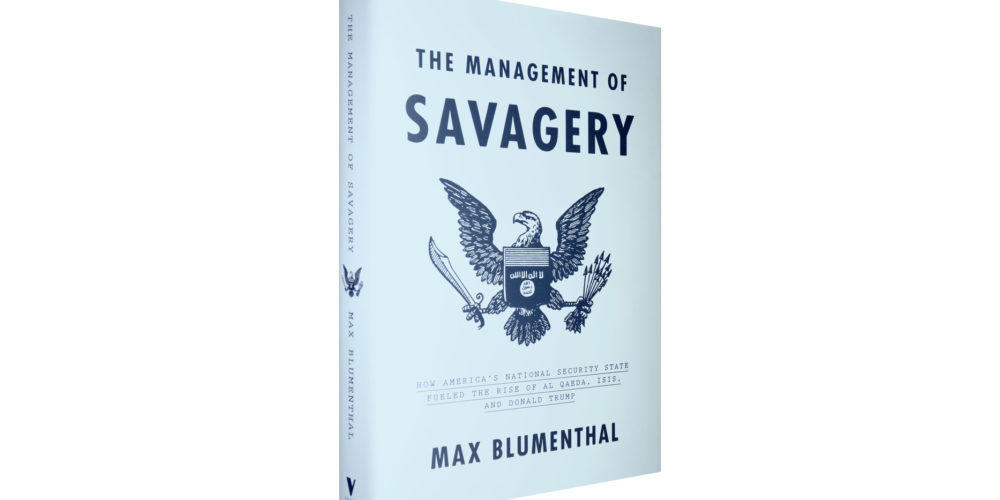■ Max Blumenthal, The Management of Savagery: How America’s National Security State Fueled the Rise of al Qaeda, ISIS, and Donald Trump (London and New York: Verso, 2019).
This is a valuable book, as it charts how the United States, since the late 1970s up until today, has deliberately funded and supported Islamist jihadists to obtain foreign-policy goals.
It began with “Operation Cyclone” in Afghanistan, the brainchild of President Carter’s national security adviser and Polish aristocrat Zbigniew Brzezinski. Under his instruction, the CIA funnelled up to $1 billion to the rural and deeply conservative Afghan tribal leaders, who opposed the continuing secularisation of Afghan life. Brzezinski’s aim was to “induce a Soviet intervention” and so embroil Moscow in its own Vietnam-type war.
Soon Saudi Arabia and tens of thousands of foreign fighters, “Afghan-Arabs,” were part of the Islamist-driven rebellion against the Soviet army. President Zia’s Pakistan co-ordinated the arming of the mujahideen. By 1989 these “liberators” were targeting minorities such as the Hazaras, having graduated from throwing acid in the face of female students at Kabul University.
Fort Bragg in North Carolina was then the hub of the Afghan proxy war, and to this day it remains the heart of US black operations. (In the first two months of 2020 five US military flights coming from or going to Fort Bragg travelled via Shannon Airport.)
The United States continues to manage similar jihadist monsters in the province of Idlib in Syria. In 2017 al-Qa‘ida, a.k.a. al-Nusra Front, established a “liberated area.” The region was certainly free of Christians. Those who failed to flee had been wiped out.
Idlib’s town centre became the focus of public executions. In January 2017 a 21-year-old woman accused of adultery was shot through the head. Areas close to Idlib were occupied by thousands of Turkestani and Chinese Uighur jihadists.

Max Blumenthal, in his detailed examination of the Syrian conflict, notes that 7 million Syrians fled “rebel-held” areas for the safety of the government-controlled areas—something the biased Western media refuse to acknowledge.
Throughout the Syrian conflict it has never ceased to amaze me how many Irish supporters of Palestine fail to grasp that this is a US proxy war, waged in the interests of Israel and imperialism. Blumenthal reveals that in 1996, with Netanyahu’s ascension as prime minister, he set up a think tank in Israel, the Institute for Advanced Strategy and Political Studies, with offices in Washington. It drafted a blueprint for remaking the Middle East in accordance with Netanyahu’s vision.
Written by Richard Perle and Douglas Feith and entitled “A Clean Break: A New Strategy for Securing the Realm,” it aimed to replace violently any regional state that challenged Israel’s expansionist agenda. Saddam’s Iraq was first on the list, then Syria. Employing US allies, such as Jordan and Turkey, they proposed weaponising the heavily religious rural Sunni population as a proxy force in Syria, the very people who would later rally behind al-Qa‘ida and ISIS.
A year after “A Clean Break” was published, these same neo-cons created the “Project for the New American Century.” One of its manifestos read: “Further, the process of transformation, even if it brings revolutionary change, is likely to be a long one, absent some catastrophic and catalysing event—like a new Pearl Harbor.”
When that 9/11 event arrived the neo-cons, then well embedded in the Bush government, began to prepare for a clean break by overthrowing “7 countries in 5 years,” as retired General Wesley Clarke has recounted.
First Afghanistan: hypocritically presented as a civilisation mission. Then Iraq: Blumenthal recounts the creation of a sectarian conflict in Iraq, where one had never existed. Jordanian veterans of the Afghan war began the slaughter of Shias, and General David Petraeus created US-trained killer squads of Shias to retaliate. A bloody sectarian war swelled the ranks of the nascent Islamic State.
In 2004 Abu Bakr Naji, an al-Qa‘ida ideologue, produced his influential Management of Savagery, a blueprint for destabilising the Middle East that “echoed the agenda of the neo-cons’ ‘A Clean Break’.”
By 2011 the neo-cons were no longer at the helm of US foreign policy when it came to undermining the Libyan and Syrian states. However, Samantha Power, “the icon of military humanism” (and darling of RTE), and Hillary Clinton were nested in Obama’s government. Not categorised as neo-cons, their actions and goals were the same. They turned Libya from a prosperous state into a failed one.
Jihadist proxies were employed and armed by the United States, Qatar (the mentor-state of the Muslim Brotherhood), and United Arab Emirates. And there was a little help from Britain’s MI6, including the anti-Gaddafi “Manchester Boys.”
The ruse used at the UN Security Council to sanction a “no-fly zone” was to prevent civilian casualties. Al-Jazeera’s lies—echoed in the West—of impending massacres and mass rapes by Viagra-crazed Gaddafi troops sealed that country’s fate. Gaddafi had retaken most Libyan cities with about a thousand dead. The bloodbath happened only after NATO’s intervention.
Blumenthal’s book concludes where it began: Russia. Washington’s antipathy towards President Putin stems from his steps to end the “disaster capitalism” under Yeltsin that had impoverished the Russian people. In 2004 a letter addressed to the EU and NATO signed by leading American neo-cons and liberal interventionists condemned Putin for going back on Yeltsin’s “achievements,” deploring in particular the restoration of the Kremlin’s control over national affairs at the expense of US-friendly oligarchs.
No surprise that Joe Biden and Madeleine Albright are signatories, as was the then head of Human Rights Watch, Tom Malinowski, which speaks volumes about that group’s origins.
From this time stems the West’s aggressive policy of destabilisation in the East: from the Georgian failed invasion of East Ossetia to the many “coloured revolutions,” the coup in Kiev, and the “Pussy Riot” hullabaloo, in support of US-backed oligarchs.
President Medvedev’s failure to veto the Libyan invasion at the United Nations ultimately led to Vladimir Putin returning to the helm and Russia resolving to come to the aid of the Syrian people. This ended the unipolar world or what the neo-cons called the “benevolent global hegemony,” which they sought to maintain by the management of savagery.






